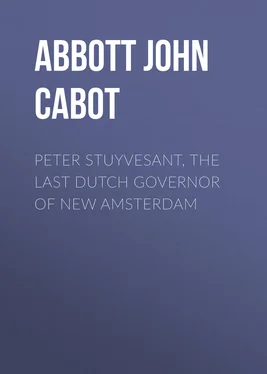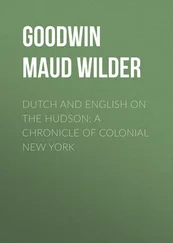John Abbott - Peter Stuyvesant, the Last Dutch Governor of New Amsterdam
Здесь есть возможность читать онлайн «John Abbott - Peter Stuyvesant, the Last Dutch Governor of New Amsterdam» — ознакомительный отрывок электронной книги совершенно бесплатно, а после прочтения отрывка купить полную версию. В некоторых случаях можно слушать аудио, скачать через торрент в формате fb2 и присутствует краткое содержание. Жанр: foreign_prose, История, foreign_edu, foreign_antique, на английском языке. Описание произведения, (предисловие) а так же отзывы посетителей доступны на портале библиотеки ЛибКат.
- Название:Peter Stuyvesant, the Last Dutch Governor of New Amsterdam
- Автор:
- Жанр:
- Год:неизвестен
- ISBN:нет данных
- Рейтинг книги:3 / 5. Голосов: 1
-
Избранное:Добавить в избранное
- Отзывы:
-
Ваша оценка:
- 60
- 1
- 2
- 3
- 4
- 5
Peter Stuyvesant, the Last Dutch Governor of New Amsterdam: краткое содержание, описание и аннотация
Предлагаем к чтению аннотацию, описание, краткое содержание или предисловие (зависит от того, что написал сам автор книги «Peter Stuyvesant, the Last Dutch Governor of New Amsterdam»). Если вы не нашли необходимую информацию о книге — напишите в комментариях, мы постараемся отыскать её.
Peter Stuyvesant, the Last Dutch Governor of New Amsterdam — читать онлайн ознакомительный отрывок
Ниже представлен текст книги, разбитый по страницам. Система сохранения места последней прочитанной страницы, позволяет с удобством читать онлайн бесплатно книгу «Peter Stuyvesant, the Last Dutch Governor of New Amsterdam», без необходимости каждый раз заново искать на чём Вы остановились. Поставьте закладку, и сможете в любой момент перейти на страницу, на которой закончили чтение.
Интервал:
Закладка:
The island of Manhattan, upon which the city of New York is now built, consisted then of a series of forest-crowned hills, interspersed with crystal streamlets and many small but beautiful lakes. These solitary sheets of water abounded with fish, and water-fowl of varied plumage. They were fringed with forests, bluffs, and moss-covered rocks. The upper part of the island was rough, being much broken by storm-washed crags and wild ravines, with many lovely dells interspersed, fertile in the extreme, blooming with flowers, and in the season, red with delicious strawberries. There were also wild grapes and nuts of various kinds, in great abundance.
The lower part of the island was much more level. There were considerable sections where the forest had entirely disappeared. The extended fields, inviting the plough, waved with luxuriant grass. It was truly a delightful region. The climate was salubrious; the atmosphere in cloudless transparency rivalled the famed skies of Italy.
Where the gloomy prison of the Tombs now stands, there was a lake of crystal water, overhung by towering trees. Its silence and solitude were disturbed only by the cry of the water-fowl which disported upon its surface, while its depths sparkled with the spotted trout. The lake emptied into the Hudson river by a brook which rippled over its pebbly bed, along the present line of Canal street. This beautiful lake was fed by large springs and was sufficiently deep to float any ship in the navy. Indeed it was some time before its bottom could be reached by any sounding line.
There was a gentle eminence or ridge, forming as it were the backbone of the island, along which there was a narrow trail trodden by the moccasined feet of the Indian, in single file for countless generations. Here is now found the renowned Broadway, one of the busiest thoroughfares upon the surface of the globe.
On the corner of Grand street and Broadway, there was a well-wooded hill, from whose commanding height one obtained an enchanting view of the whole island with its surrounding waters. Amidst these solitudes there were many valleys in whose peaceful bosoms the weary of other lands seemed to be invited to take refuge.
Indeed it is doubtful whether the whole continent of North America presented any region more attractive. The salubrity of its clime, the beauty of the scenery, the abundance and purity of the waters, the spacious harbor, the luxuriance of the soil and the unexplored rivers opening communication with vast and unknown regions of the interior, all combined in giving to the place charms which could not be exceeded by any other position on the continent.
The success of the first trading vessel was so great that, within three years, five other ships were sent to the "Mauritius river" as the Hudson was first named. There was thus opened a very brisk traffic with the Indians which was alike beneficial to both parties. Soon one or two small forts were erected and garrisoned on the river for the protection of the traders. Manhattan island, so favorably situated at the mouth of the river, ere long became the headquarters of this commerce. Four log houses were built, it is said, upon the present site of 39, Broadway.
Here a small company of traders established themselves in the silence and solitude of the wilderness. Their trading boats ran up the river, and along the coast, visiting every creek and inlet in the pursuit of furs. The natives, finding this market thus suddenly opening before them, and finding that their furs, heretofore almost valueless, would purchase for them treasures of civilization of almost priceless worth, redoubled their zeal in hunting and trapping.
A small Indian settlement sprang up upon the spot. Quite large cargoes of furs were collected during the winter and shipped to Holland in the spring. The Dutch merchants seem to have been influenced by a high sentiment of honor. The most amicable relations existed between them and the Indians. Henry Christiænsen was the superintendent of this feeble colony. He was a prudent and just man, and, for some time, the lucrative traffic in peltry continued without interruption. The Dutch merchants were exposed to no rivalry, for no European vessels but theirs had, as yet, visited the Mauritius river.
But nothing in this world ever long continues tranquil. The storm ever succeeds the calm. In November, of the year 1613, Captain Argal, an Englishman, in a war vessel, looked in upon the little defenceless trading hamlet, at the mouth of the Hudson, and claiming the territory as belonging to England, compelled Christiænsen to avow fealty to the English crown, and to pay tribute, in token of his dependence upon that power. Christiænsen could make no resistance. One broadside from the British ship would lay his huts in ruins, and expose all the treasures collected there to confiscation. He could only submit to the extortion and send a narrative of the event to the home government.
The merchants in Holland were much alarmed by these proceedings. They presented a petition to the States-General, praying that those who discovered new territory, on the North American continent, or elsewhere, might enjoy the exclusive right of trading with the inhabitants of those regions during six consecutive voyages.
This request was granted, limiting the number of voyages however to four instead of six. In the meantime the Dutch merchants erected and garrisoned two small forts to protect themselves from such piratic excursions as that of captain Argal. In the year 1614 five vessels arrived at Manhattan to transport to Europe the furs which had been purchased. Just as Captain Block was preparing to return, his ship, the Tiger, which was riding at anchor just off the southern point of Manhattan island, took fire, and was burned to the water's edge.
He was a very energetic man, not easily dismayed by misfortune. The island abounded with admirable timber for ship building. He immediately commenced the construction of another vessel. This yacht was forty-four and a half feet long, and eleven and a half feet wide. The natives watched the growth of the stupendous structure with astonishment. In the most friendly manner they rendered efficient aid in drawing the heavy timber from the forest to the shipyard. They also brought in abundant food for the supply of the strangers.
Early in the spring of 1614 the "Restless" was launched. Immediately Captain Block entered upon an exploring tour through what is now called the East River. He gave the whole river the name of the Hellegat, from a branch of the river Scheldt in East Flanders. The unpropitious name still adheres to the tumultuous point of whirling eddies where the waters of the sound unite with those of the river.
Coasting along the narrow portion of the sound, he named the land upon his right, which he did not then know to be an island, Metoac or the Land of Shells. We should rather say he accepted that name from the Indians. On this cruise he discovered the mouths of the Housatonic and of the Connecticut. He ascended this latter stream, which he called Fresh River, several leagues. Indian villages were picturesquely scattered along the shores, and the birch canoes of the Indians were swiftly paddled over the mirrored waters. All else was silence and solitude. The gloom of the forest overshadowed the banks and the numerous water-fowl were undisturbed upon the stream. The natives were friendly but timid. They were overawed by the presence of the gigantic structure which had invaded their solitude.
Continuing his cruise to the eastward he reached the main ocean, and thus found that the land upon his left was an island, now known as Long Island. Still pressing forward he discovered the great Narragansett Bay, which he thoroughly explored, and then continued his course to Cape Cod, which, it will be remembered, Sir Henry Hudson had already discovered, and which he had called New Holland.
Читать дальшеИнтервал:
Закладка:
Похожие книги на «Peter Stuyvesant, the Last Dutch Governor of New Amsterdam»
Представляем Вашему вниманию похожие книги на «Peter Stuyvesant, the Last Dutch Governor of New Amsterdam» списком для выбора. Мы отобрали схожую по названию и смыслу литературу в надежде предоставить читателям больше вариантов отыскать новые, интересные, ещё непрочитанные произведения.
Обсуждение, отзывы о книге «Peter Stuyvesant, the Last Dutch Governor of New Amsterdam» и просто собственные мнения читателей. Оставьте ваши комментарии, напишите, что Вы думаете о произведении, его смысле или главных героях. Укажите что конкретно понравилось, а что нет, и почему Вы так считаете.












